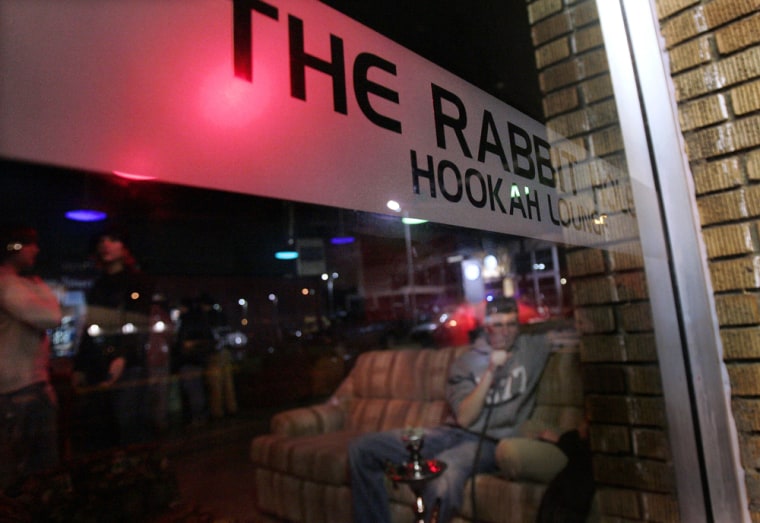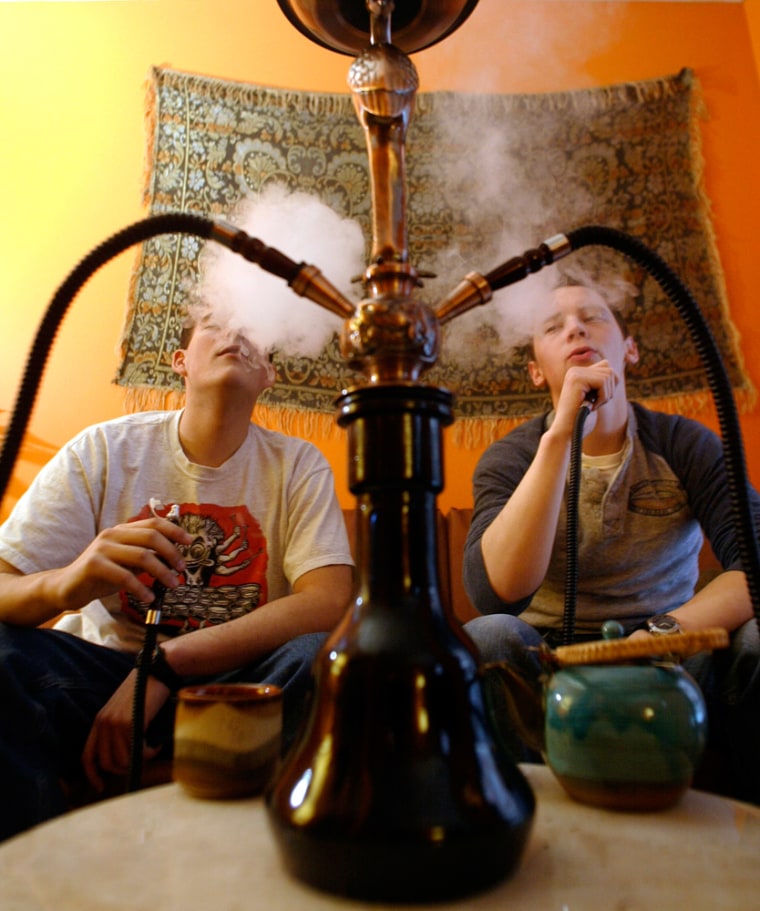The Rabbit Hole is a maze of sofas and sectionals, mismatched, some worn to threads in places, full of soft spots that sink low to the ground. The lighting is low and dim; the music is usually alternative rock, played at a volume to match the light.
No alcohol is served at the Rabbit Hole — just soft drinks, and hookah.
Hookah is a flavored tobacco, inhaled through a tall, ornate pipe that sits on the floor; it has long been a popular pastime in Amman and Alexandria and all across the Middle East.
But this is Roosevelt Way in Seattle, cater-corner from University Mazda and down the street from Mamma Melina's restaurant. And that is something new — even as America is at war in the Middle East, this bit of the Middle East has found a place in America.
In liberal and literate Seattle, hookah lounges have opened on trendy downtown blocks and in predominantly white neighborhoods in the outer city, where the Rabbit Hole is located. Its customers are not middle-aged Egyptian men, but white kids from the suburbs.
"I'd almost call it an epidemic," said Sean O'Neill, 20, a personal trainer who lives in Tacoma, Wash., and first tried hookah last spring.
The contagion may stall — in November, Washington voters enacted one of the nation's strictest smoking bans. The law could shutter places like the Rabbit Hole; similar smoking bans could imperil hookah parlors around the country.
The laws are universally aimed at cigarette smoking; they may not specifically target hookah, but there is no exception for the parlors, either.

The parlors first opened in the United States decades ago in the immigrant quarters of New York and Los Angeles, in neighborhoods like Astoria, Queens, and Bay Ridge, Brooklyn. For years, they were patronized mostly by men of Egyptian, Lebanese or Syrian descent, and occasionally a curious American who recognized the pipes from a trip he might have taken.
In the past year or two, parlors have opened in college towns all over in the country, in Florida, Iowa, and Wisconsin, often operated by foreign students from the Middle East, wishing for a piece of home.
But in recent months, hookah has spread to the world of hipsters and yuppies in cities in all regions of the country. Customers can smoke hookah in the Chi-Cha Lounge, a trendy, Latin-themed restaurant on U Street in Washington D.C., or at Mantra, an upscale French-Indian restaurant in Boston's Ladder District.
At the Chicago nightclub Zentra, hookah can be smoked amid techno music and belly dancers wearing body paint. There are hookah lounges in Denver, Houston, Las Vegas and Miami, complete with glass tables, plasma televisions and oxygen bars.
"It's at its largest demand ever in this country," said Brennan Appel, who runs Florida-based SouthSmoke.com, an online purveyor of hookah pipes and tobacco. "I don't think it's going away anytime soon. There's so much more room for the product to expand. Only a small percentage of Americans know about it."
In cities where only one hookah lounge existed, there are now seven or eight, Appel said. Where there were none, there is at least one. Because hookah is typically shared, friends introduce it to others. Even the Iraq war has played some role, Appel said; he suspects soldiers posted in the Gulf tried hookah, liked it and sought it out once they returned home.
"I haven't yet heard of a hookah lounge opening and going out of business," said Appel. The biggest demand for hookah, he said, is in California, Arizona, New York, Texas and Virginia.
Most of the tobacco is imported from the United Arab Emirates, Jordan, Egypt and Saudi Arabia; as a way of catering to Western tastes, tobacco manufacturers are introducing flavors like kiwi, watermelon and blackberry. Handcrafted pipes made of glass and brass are produced in Syria and Egypt, although China is making less expensive pipes out of acrylic.
The tobacco is held in a bowl near the top of the pipe, kept lit by red-hot charcoal. The smoke is drawn through water before being sucked through a long tube. Pipes can have one tube, or as many as six, so that many people can share the tobacco.
Pipes cost between $50 and $180. In lounges and bars, the tobacco is sold in batches for as little as $5 or as much as $20. One batch can last a person an hour or longer.
"I can smoke hookah at home, but coming here is like a treat," said Brenda Wright, 20, one of a group of friends who visit the Rabbit Hole several times a week. "I've noticed it's gotten a lot more popular just in the past two months."
Friday and Saturday nights at the Rabbit Hole are so crowded, some people (many of them are students from the nearby University of Washington) end up sitting on the floor. The other nights are for the regulars, many under the age of 21.
The scene is different at the Egyptian Caf?? on Steinway Street in Astoria, Queens. On most nights, the clientele in the Egyptian Caf?? is predominantly Middle Eastern. There are few frills and little glamour, just chairs and small tables and men poring over backgammon and dominos.
The time spent in the immigrant hookah lounges is workaday and routine. Said Elmekabati, 35, a businessman from Brooklyn, often entertains clients at the Egyptian Caf??. Hesham Amin comes here almost everyday. It is like an extension of his living room — Starbucks, but with smoke.
Amin, 38, who was raised in Alexandria, Egypt, is a customer. Sometimes, he says, he sees more Americans than Egyptians.
"Everybody comes here," he said, pointing the direction of a young couple canoodling in a corner. Jose Ocampo is 19; Sanjana Chowdhury is 18. Hookah, for them, was an acquired taste. The smoke made them light-headed. But they grew fond of the flavor and the effect.
"At first I came here so I could spend time with him," Chowdhury said. "Now I'm not sure if I'm addicted to the hookah or addicted to him."
There has been some backlash to the hookah craze. In Anaheim, Calif., city officials attempted to regulate some hookah lounges after complaints by neighbors of noise and rowdiness. The owners, primarily Middle Eastern immigrants, accused officials of cultural bias.
But the biggest problem for owners of hookah parlors are smoking bans in many cities. New York's 2003 ban, at first, did practically nothing to limit the hookah dens in Astoria and Bay Ridge. Although the places violated the law, officials generally looked the other way since it was obvious that customers frequent hookah bars only to smoke, and because the ban was not aimed at hookah smokers. The future of hookah and smoking bans is still unresolved. For right now, it is a matter of case-by-case enforcement.
Days after the ban went into effect in Seattle, owners of the Rabbit Hole continued to serve hookah, not so much defying the law as ignoring it. A new sign on the front door read, "private club members only — inquire within." One of the Rabbit Hole's owner declined to answer questions about the ban, saying only that he intended to continue operating his business.
The effect of hookah on health is an issue. Medical research is scarce on the effects of smoking hookah, although doctors agree that smoking any kind of tobacco is not healthy.
"It's worthy of scientific study," said Dr. Norman Edelman, chief medical officer with the American Lung Association. "I can tell you none have been planned. But it is tobacco. And all tobacco contains any number of chemicals that are harmful."
Users claim that because hookah smoke is drawn through water contained in the pipe, the smoke is less harmful — an assertion that doctors say has no merit.
"People in my country have been smoking hookah for centuries," Amin said. "I've never heard of anyone getting sick and dying."
